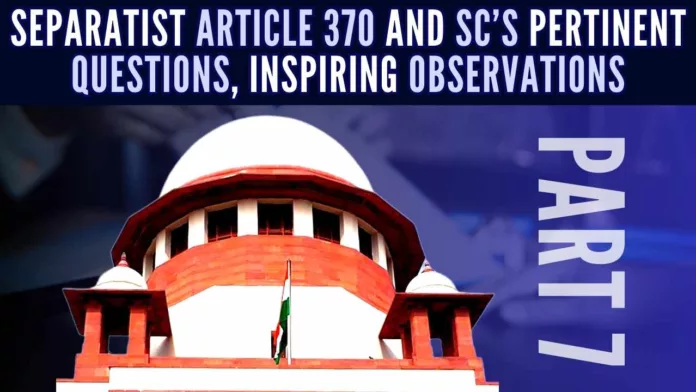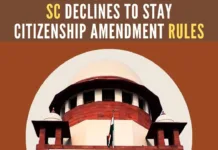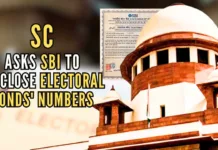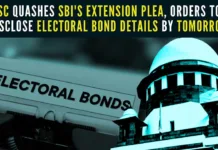
The previous 6 parts of the article can be accessed here Part 1, Part 2, Part 3, Part 4, Part 5, Part 6. This is the seventh part
SC hearing on Article 370 abrogation
Pro-Pak slogans in J&K Assembly
On September 3, an important development took place. That day, Roots of Kashmir, an organization of the hounded out and persecuted Kashmiri Hindus, questioned in the Supreme Court the credentials of J&K National Conference leader Mohammad Akbar Lone, one of the main petitioners challenging the abrogation of Article 370, claiming he was a supporter of secessionist forces. An intervention application in the apex court had been filed by ‘Roots in Kashmir’, which sought to bring some additional documents and facts on record in the matter. It said that Mohammad Akbar Lone is known as “a supporter of secessionist forces operating in J&K, who support Pakistan.”
In fact, their intervention application, inter-alia, read like this: “The petitioner No. 1…(Mohd Akbar Lone), was a member of the Legislative Assembly from 2002 to 2018 and has shouted slogans like ‘Pakistan Zindabad’ on the floor of the J&K Assembly…The said fact was widely reported by media houses. Thereafter, he not only admitted shouting the slogan but refused to tender an apology when asked by the journalists. Lone, also while addressing the media, hesitated to identify himself as an Indian. Similarly in his rallies also he is known for spreading pro-Pakistan sentiments…Two mainstream political parties of J&K — National Conference represented by Mohd Akbar Lone and People’s Democratic Party (PDP) represented by its President Mehbooba Mufti — are among those who have challenged the abrogation of the provision which bestowed special status on the erstwhile State. Both the referred mainstream parties in J&K have openly supported Article 370 and have vehemently opposed any exercise that merely applies the entire Constitution to all the people of J&K…Lone, representing the National Conference party, has often openly made pro-Pakistan statements and probably explains his opposition to challenge any move that brings the people of J&K on par with the rest of the country”[1].
The moment constitution bench resumed hearing on September 4, Solicitor General Tushar Mehta, Bimal Jad, counsel for Roots in Kashmir, Rakesh Dwivedi, and V Giri raised the issue as raised by the Kashmiri Hindu organization. Mehta said: “Lone is a key petitioner in petitions challenging the changes made to Article 370 of the Constitution…The court should look at it from that light as to who is demanding the continuation of Article 370…He should file an affidavit that I (Lone) owe allegiance to the Constitution of India because I (Lone) am before the highest court of the country. ‘Lone is not an ordinary man but he is a member of Parliament’ and that it is not enough that he expresses remorse. ‘He must say I oppose and object to terrorism and any secessionist activity by Pakistan in J&K or elsewhere.’ It must come on record”.
Bimal Jad, inter-alia, said: “He had filed an additional affidavit giving details…Lone had expressed no remorse for what he said.” Yet another counsel pointed out that “the parliamentarian said outside the House that he stood by whatever he said in the J&K Assembly.”
As for advocate Rakesh Dwivedi, he, among other things, said: “Lone should apologize…If he is invoking the Constitution of India, then he can’t stand outside the Constitution of India…”[2].
The arguments advanced by V Giri were no different. He, inter-alia, said: “Somebody comes before the highest court of the land, challenges Presidential Orders and he doesn’t apologize. If he has made that statement, his submissions should be taken on record only if he apologizes before your lordships and puts it on record“[3].
Defending the indefensible
The moment Justice Kaul pointed to Kapil Sibal that lawyers for respondents (those supporting abrogation of Article 370) had submitted that what Lone allegedly said was “not in sync”, Sibal said: “I’m not concerned with that. If he has said it, in what circumstances, is it recorded, you ask him for an affidavit. I won’t stand for him in this court if he doesn’t file an affidavit…He is an MP of Lok Sabha. He is a citizen of India and sworn to his office by the Constitution. He accepts the sovereignty of India…How can he say otherwise? He is a member of Parliament. And if he has said it, at my level, I deprecate it. I personally don’t subscribe to what he has said…The alleged incident is of the J&K Assembly session in 2018 and there were other people also who were present. ‘I was not aware of it until this morning when someone pointed it out to me’. Let’s not go into all these. There was a Speaker of the Assembly from BJP who asked him to say something. He was asked to say something that people ask other people to say on the streets of this country. Why do we need to go into all this? Let’s focus on our legal issue.”
Significantly, Chief Justice Chandrachud also took serious cognizance of the issue raised by the Roots in Kashmir. He said: “When he (Lone) invokes the jurisdiction of our court under Article 32 of the Constitution, we take it that he necessarily abides by the Constitution. We want to have it from him in the affidavit that he unconditionally accepts that J&K is an integral part of India and that he abides by and owes allegiance to the Constitution of India.” He asked Sibal “to ask Lone to file a short affidavit by Tuesday (Sep 5)” and Kapil yielded[4].
Political sovereignty rests with the Union
Senior counsel Mahesh Jethmalani, who appeared for Gujjars and Bakerwals (all Sunni Muslims), among other things, said: “All documents from 1948 to 1950 – all constitutional documents indicate that a constituent assembly for the purpose of framing a constitution was necessary. This is why Article 370(3) referred to the Constituent Assembly. This doesn’t mean that once the Constituent Assembly completed its task – which was the task of framing the Constitution, Article 370(3) would have no meaning and it would be otiose. On the contrary, the Constitution Orders issued from 1948 onwards indicate two things – 1. They expressly indicate that Constituent Assembly and Legislative Assembly insofar as it apply to the Constitution of India are synonymous.”
When the Chief Justice said that “the fact still remains that after the Constitution of J&K was framed on 26 January 1957, Article 367(4)(d) was again amended to delete clause (d)” and “so the equivalence between constituent and legislative assembly ceases the moment Constitution of J&K is framed”, Jethmalani opined that “this was deleted because, after the dissolution of the Constituent Assembly, the constituent power in J&K was now the Legislative Assembly” and that “the power of amendment under Art 368 is in virtue of constituent power.”
Jethmalani agreed with the Chief Justice when the latter said that “the only difference is that legislature which exercises the power of amendment is not a constituent Assembly, it is exercising a constituent power,” and said: “I agree but the alternative conclusion would be that you could never abrogate Article 370…” He also said: “All that the amendment to 367 did was to recognize an implicit provision. It was not only synonymous but also its successor. Constitution Order 272 did not make a substantive change. It made a clarificatory change which was already implicit”[5].
To make his point that Article 370 was a temporary provision and political sovereignty rests with the Union, Jethmalani further said: “Article 370 is a provision that is a part of the temporary provisions of the Constitution. The title of the Article describes the provision as temporary provisions…Unless clearly stated, it would not take away the substantive rights under the provision (Article 370(3)…Legislative sovereignty is divided into the Union and the state…the matters in the Concurrent List acceded to by the then Maharaja are within the realm of Centre with Union, and internal sovereignty which is then distributed between Union and state…Article 370(3) is indicative of the fact that ultimate legal sovereignty, in the sense that you can get away with the tunnel altogether, that ultimate legal sovereignty rests with the Union of India…147© is an acknowledgment by the State of J&K that they cannot touch the Constitution of India as applicable to the State of J&K…As far as political sovereignty is concerned, it rests with the Union, qua the state. A simple look at the Preamble would show that. The Preamble of the two – the Union and the State of J&K would reveal that…Have a look at our preamble. The word ‘sovereign’ is key here. In contrast, see the J&K Constitution Preamble. The Preamble makes no mention of sovereignty. It defines the existing relationship between the Union and the state. It’s an acknowledgment of the Union’s sovereignty over the state…”[6].
Article 370 not in sync with federal features
Continuing his arguments, advocate V Giri said: “Dr. B R Ambedkar justified the slanting of power in lawmaking towards the centre during the Constituent Assembly debates…Article 370 carved out an area that is not in sync with the general federal features of the constitution for the rest of the country and the Union. This sets out the relationship between the Union and J&K on a plane…I am not saying higher or lower, I am saying at a plane different from the constantly interworking relationship between the Union and other states…With the abrogation of Article 370, all provisions of the Indian Constitution became applicable to J&K and J&K consequently became a state at complete par with all other states…” “If Article 370 is resurrected, that would be violative of the basic structure of the Constitution,” asserted Giri.
Of course, opposing such a submission, the Chief Justice said: “This might be a little too farfetched because then that would be to postulate that original Article 370 was violative of basic structure…You cannot invite us to hold in your favour on an unstateable proposition.”
Article 370 has a self-destruction mechanism
In addition, Solicitor General K M Nataraj also argued in support of the August 2019 reforms. His arguments, inter-alia, read like this: “Article 370 is the only provision in the Constitution that has a self-destruction mechanism and that the continued application of Article 370 is opposed to the basic structure of the Constitution…The doctrine of federalism has no application so far as the process under Article 370 is concerned.”
Giri also compared Article 368 and Article 370 by saying “Kindly have a look at Article 368 in juxtaposition to Article 370” and said: “Article 368 recognizes federalism in the matter of amendment to the Constitution.” “The collective consent theory is introduced under Article 368 for the purpose of amending the Constitution. When it comes to Article 370, the language is just a recommendation,” he further said. He insisted that “reading these two articles together in a different language will make either of them redundant” when the Chief Justice said: “But equally, the adaptation to the constitution ensured that even in the matter of amendment, the President still has to go through the route of Article 370(1).”
Significantly, Justice Khanna agreed with the contention of ASG Nataraj and said: “Mr. Nataraj, what you are probably trying to highlight is that the argument that the federal structure gets affected because of abrogation of Article 370 should not be accepted for the reason that the federal structure is protected by Article 368”.
The fact of the matter is that the upshot of Nataraj’s whole argument was: “It is a unique, extraordinary power conferred on the President to abrogate or change – which has the flavor of constituent power, executive power, and legislative power. That is a plenary power conferred on the President. Such an extraordinary power should not be read with any limitations and it must be given the fullest meaning”.
Section 6, Article 35A discriminatory
Advocate Guru Krishna Kumar, who appeared for intervenors who are persons displaced from PoJK, said: “The rights perspective is the decisive factor determining the tenability of the challenge mounted by the petitioner. The rights perspective will trump all allegations of procedural infirmities…His clients have suffered because of Section 6 of the J&K Constitution and Article 35A of the Indian Constitution as applicable to J&K. I have given the case of how around 8700 people left that place during the partition. Today, after the promulgation of impugned Constitutional Orders, at least 23,000 people have received domicile certificates…What they (petitioners) are saying now is that asymmetric federalism is being recognized. Now please stretch this and say that the multi-symmetric federalism of Article 370 should also be taken to be a basic feature of or facet of federalism…Today what they want to do is – equate Article 370, which is temporary, with Article 371, which is special provisions. That is why I say it is a derivate argument they want to make…The impugned Constitution Orders are reflective of transformative constitutionalism…They ensure that the Constitution of India with all its plenary scope applies to J&K and make provisions for the realization of rights. The challenge of the petitioners is a contradiction in terms because this is a case where the application of the Constitution of India is sought to be challenged”[7].
Guru Krishna Kumar also highlighted how “thousands of Hindu and Sikh families, who had to flee PoJK, have not been able to return to their ancestral homes till date and were ‘also denied other benefits extended to similarly placed displaced persons’ in the erstwhile state…As per Section 6 (of J&K Constitution), his clients, who were displaced forcefully by circumstances, lost the right to be permanent residents, notwithstanding that they were State Subjects as on August 15, 1947. Those who did not fall within this definition of permanent residents as per the provision would have to fall back on the definition of permanent resident in the 1927 order issued by the then ruler of J&K.”
It is important to note what Justice Khanna said as far as Section 6 and Article 35A were concerned. Questioning the requirements prescribed by the Constitution of J&K for those desirous of acquiring permanent resident status, he said: “This is also very odd, to say that you must own a property to ‘get permanent resident status…” Justice Khanna asked: “Whether it would not be difficult to get documents of 1927”[8].
Federal diversity
Advocate Kanu Agarwal‘s arguments against the petitioners’ arguments were: “Federal diversity in the constitution exists on a two – dimensional plane. At the Centre would be the classical understanding of a state. To the right of it would be states with limited special features like Gujarat or Maharashtra. Thereafter would be states under the Fifth or Sixth Schedule. To the right end of it was the erstwhile Article 370. What the petitioners forget is that there is a scale to the left of it as well. The scale to the left is the union territories with the legislature, the Union Territory of GNCT of Delhi, and perhaps pure union territories. Therefore, federal diversity is undoubted. Diversity is a constitutional fact but not all facts can be elevated to the basic structure.”
Agrawal also pointed out that the “Maharaja of J&K had already recognized the supremacy of the Indian Constitution and accordingly Article 1 of the Constitution (of India) was enforced.” “The Maharaja who was not a sovereign could not have passed a better title than what he had. If he was not a sovereign, the Constituent Assembly could never have been a sovereign constituent Assembly – could never have established,” said Agarawal[9].
Kashmir needs solution, not majoritarian interpretation
Advancing rejoinder arguments virtually rattled and angry Kapil Sibal said: “There should not be an ‘emotive majoritarian interpretation’ of the Indian Constitution by those supporting abrogation of Article 370…The sovereignty of India was never under challenge…If we look at history, J&K is not completely linked to India. The erstwhile state had a separate detailed Constitution and administrative and executive structure. It was never asked to sign a merger agreement…When Article 370 says that ‘concurrence’ of the state government with respect to certain subjects is required, it means the executive can also say ‘no’…”
Sibal reiterated his argument that “Article 370 acquired a permanent character once the term of the Constituent Assembly of J&K got over in 1957 after drafting the state’s Constitution.” He asserted that “we should interpret the Constitution textually and contextually, but not by looking at what there is in silence” and said: “Abrogation of Article 370 is a political process and it must have a political solution.”
Solution has to be within constitutional framework
Sibal said what he said despite the Chief Justice’s observation that “the Indian Constitution does not specify what would happen after the Constitution of J&K comes into force.” “You see, there is no express provision. There is complete silence as to what will happen after the J&K Constitution comes into force. It was like allowing Article 370 to operate and let the process of integration (of J&K) get over. But, at what time integration will be over is not hedged in the Constitution of India…So, you (Sibal) are saying there is no solution for the abrogation of Article 370 within the constitution and that a political solution has to be found. We have to keep in mind that all solutions have to be within the framework of the Constitution,” the Chief Justice had observed[10].
To be continued…
Note:
1. Text in Blue points to additional data on the topic.
2. The views expressed here are those of the author and do not necessarily represent or reflect the views of PGurus.
Reference: –
[1] KP group questions Lone’s credentials – Sep 4, 2023, Daily Excelsior
[2] Supreme Court asks Akbar Lone to file affidavit owing allegiance to Constitution – Sep 4, 2023, Indian Express
[3] Hearing on Article 370: Centre objects to NC leader Akbar Lone’s pro-Pakistan slogans – Sep 5, 2023, The Tribune
[4] Pro-Pak slogan: SC asks National Conference MP Akbar Lone to file an affidavit saying he owes allegiance to the Constitution – Sep 4, 2023, PGurus.com
[5] Article 370 Highlights: ‘Never challenged the sovereign part of India’ says Kapil Sibal – Sep 4, 2023, India Today
[6] Article 370 | Argument That Resurrection Of Article 370 Would Violate Basic Structure Too ‘Far Fetched’: Supreme Court [Day 15] – Sep 4, 2023, Live Law
[7] Supreme Court hearing on Article 370 abrogation | Day 15 – Sep 4, 2023, The Hindu
[8] J&K demand for property to give permanent resident status ‘odd’: Supreme Court – Sep 4, 2023, Indian Express
[9] Supreme Court hearing on Article 370 abrogation | Day 15 – Sep 4, 2023, The Hindu
[10] Emotive Majoritarian Interpretation Of Constitution Should Not Be Made To Justify Article 370 Abrogation, SC Told – Sep 4, 2023, Daily Excelsior
For all the latest updates, download PGurus App.










